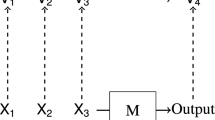Abstract
In this paper, I explore the notion of a “causal power,” particularly as it is relevant to a theory of properties whereby properties are individuated by the causal powers they bestow on the objects that instantiate them. I take as my target certain eliminativist positions that argue that certain kinds of properties (or relations) do not exist because they fail to bestow unique causal powers on objects. In reply, I argue that the notion of causal powers is inextricably bound up with our notion of what an event is, and not only is there disagreement as to which theory of events is appropriate, but on the three prevailing theories, it can be shown that the eliminativists arguments do not follow.
Similar content being viewed by others
Notes
Though note that Heil thinks that properties are particular (i.e., modes) and, thus, that properties are individuated by their particular instantiation as well.
Schaffer (2005) argues that we can have such knowledge, if knowledge is possible at all, since skepticism about which possible world we are in with regards to properties parallels skeptical arguments about the external world (for example), but I take it that Schaffer’s offered solutions will not help us further with the individuation of causal powers; but this is exactly the burden that one must meet if denying that causal powers are individuated by events.
Shoemaker (1984/2003) makes much the same argument for individuating properties by causal powers.
From hereon out, I will eliminate reference to time for ease of exposition; it should be assumed unless stated otherwise.
Of course, being a determinable or determinate property is a matter of degree; but we can safely ignore this fact for the sake of simplicity.
Mellor (1997) seems to endorse this method as well.
Keep in mind that I am dealing here with properties, and not predicates.
References
Armstrong, David M. (1978) Universals and Scientific Realism, Vol. II. A Theory of Universals. Cambridge: Cambridge University Press.
Armstrong, David M. (1983) What is a Law of Nature? Cambridge: Cambridge University Press.
Armstrong, David M. (1997) A World of States of Affairs. Cambridge: Cambridge University Press.
Clapp, Lenny (2001). Disjuntive Properties: Multiple realizations. The Journal of Philosophy 98(3): 111–136.
Dretske, Fred (1989). Reasons and Causes. Philosophical Perspectives, vol. 3 (Philosophy of Mind and Action Theory): 1–15.
Fodor, Jerry A. (1974). Special Sciences (or: The Disunity of Science as a Working Hypothesis). Synthese 28: 97–115.
Fodor, Jerry A. (1997). Special Sciences: Still Autonomous after All These Years. Philosophical Perspectives 11: 97–115.
Gillett, Carl (2002). The Dimension of Realization: A critique of the standard view. Analysis 62(4): 316–323.
Gillett, Carl (2003). The Metaphysics of Realization, Multiple Realizability, and the Special Sciences. The Journal of Philosophy: 591–603.
Gillett, Carl and Rives, Bradley (2005). The Non-Existence of Determinables: Or, a world of absolute determinables as default hypothesis. Nous 39(3):483–504.
Golman, Alvin (1970) A Theory of Human Action, New York, Prentice-Hall.
Harre, Rom and Madden, Edward H. (1975). Causal Powers, Oxford: Blackwell.
Heil, John (1999). Multiple Realizability. American Philosophical Quarterly 36(3): 189–208.
Heil, John (2003a). From an Ontological Point of View. Oxford: Claredon Press.
Heil, John and Mele, Alfred (1993). Mental Causation. Claredon Press.
Horgan, Terence (1989). Mental Quasation. Philosophical Perspectives 3: Philosophy of Mind and Action Theory, pp. 47–76.
Horgan, Terence (1997). Kim on Mental Causation and Causal Exclusion. Nous 31(Supplement: Philosophical Perspectives 11, Mind, Causation, and World): 165–184.
Kim, Jaegwon (1993). Supervenience and Mind. Cambridge, MA: MIT press.
Kim, Jaegwon (1998). Mind in a Physical World. Cambridge, MA: MIT press.
Lewis, D. (1972): “Psychophysical and Theoretical Identifications”. Australasian Journal of Philosophy 50: 249–58.
Molnar, George (1993). Powers. Steve Mumford, ed. Oxford: Oxford University Press.
Mellor, D. H. (1997). Properties and Predicates. In D. H. Mellor and Alex Oliver (eds.) Properties. Oxford University Press.
Mellor, Hugh and Oliver, Alex (1997). Properties. Oxford: Oxford University Press.
Mellor, D. H. (2000). The Semantics and Ontology of Dispositions. Mind 109: 757–80.
Schaffer, Jonathan. (2005). Quiddistic Knowledge. Philosophical Studies 123 (1-2): 1–32.
Shoemaker, Sydney (1979) Identity, Causality, and Properties. Midwest Studies reprinted in Shoemaker (2003): 234–260.
Shoemaker, Sydney (1980) Causality and Properties. In van Inwagen (1980): 109–36. Reprinted in Shoemaker (2003): 206–33.
Shoemaker, Sydney (1998) Causal and Metaphysical Necessity. Pacific Philosophical Quarterly 79: 59–77.
Shoemaker, Sydney (2001). Realization and Mental Causation. In C. Gillett and B. Loewer (eds.) Physicalism and its Discontents Cambridge: Cambridge University press. Reprinted in Shoemaker (2003) pp. 425–451.
Shoemaker, Sydney (1984/2003) Identity, Cause, and Mind: Philosophical Essays. Cambridge: Cambridge University Press.
Sosa, Ernest (1984). Mind–Body Interaction and Supervenient Causation. Midwest Studies in Philosophy IX.
Swoyer, Chris (1982). The Nature of Natural Laws. Australasian Journal of Philosophy, 60; 203–223.
Taylor, B. (1985) Modes of Occurrence: Verbs, Adverbs and Events. Oxford: Blackwell.
Van Benthem, J. (1983) The Logic of Time. Dordrecht: Kluwer.
Unger, Peter. (2006) All the Power in the World. New York: Oxford University Press.
Wrenn, Chase (forthcoming). The Unreality of Realization. Australasian Journal of Philosophy.
Yablo, Stephen (1992). Mental Causation. The Philosophical Review 101(2): 245–280.
Author information
Authors and Affiliations
Corresponding author
About this article
Cite this article
Towl, B.N. The Individuation of Causal Powers by Events (and Consequences of the Approach). Int Ontology Metaphysics 11, 49–61 (2010). https://doi.org/10.1007/s12133-010-0058-y
Published:
Issue Date:
DOI: https://doi.org/10.1007/s12133-010-0058-y



